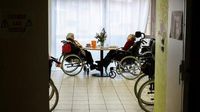France is coming to terms with the fallout from a nursing home scandal that has prompted a major overhaul of how its care facilities operate. Launched in 2022 in response to the Orpea scandal—a revelation of financial mismanagement and mistreatment of elderly residents—the vast control plan managed to unearth alarming details about conditions across the nation’s nursing homes (Ehpad). According to Charlotte Parmentier-Lecocq, the Minister of Autonomy, inspections revealed 55 establishments facing severe sanctions. "Il a été décidé soit la fermeture immédiate de l'établissement soit la mise sous tutelle pour des faits graves de maltraitance, de dysfonctionnements importants," she remarked in a recent debate aired on France 2, outlining the government’s position on maintaining standards in these facilities.
The extent of the investigation is significant; France has around 7,500 nursing homes, and by the end of December 2024, 96% had been inspected under the new directives. In a move to ensure transparency and enhance standards, the following measures were introduced: immediate closure or direct supervision for those facilities exhibiting serious issues of care mismanagement, mistreatment, or a lack of essential services. This push for reform comes after the sobering statistics emerged from the inspectors’ reports, resulting in an immediate impact on how the facilities must operate moving forward.
The investigation was ignited by the 2022 publication of "Les Fossoyeurs," a book written by journalist Victor Castanet that opened the public’s eyes to the dark realities in some of Orpea’s facilities. This book set in motion a governmental promise to inspect all of the nursing homes within a two-year time frame and to improve transparency concerning how these homes utilized public resources. Parmentier-Lecocq emphasized the urgency of restoring trust among families who rely on these services, reiterating, "Si on n'a pas cette transparence, on ne répond pas aux attentes des familles et des proches."
Yet, amid these reforms and inspections, criticisms about the system’s shortcomings have arisen, particularly from professionals in the field. Pascal Champvert, vice-president of the Association des directeurs au service des personnes âgées (AD-PA), stated unequivocally, "La réponse de l'État n'est absolument pas à la hauteur," pointing to the lacking response of the government in truly tackling the sector's foundational issues. Champvert cautioned against a misinterpretation of the inspections as a holistic solution, calling the government’s handling a "smokescreen operation." According to him, oversight should target specific failing establishments rather than broadly controlling the entire profession, which he argues undermines those facilities that provide proper care.
Furthermore, he pointedly observed that many public and associative establishments have experienced budget cuts following the scandal at Orpea, contradicting the government’s narrative. With 80% of these centers now operating at a deficit, the situation has become dire. As he described it, "le secteur ne cesse de s'appauvrir," adding that this diminishment of resources correlates directly with the industry’s inability to hire sufficient qualified staff. There were once plans by former Prime Minister Dominique de Villepin in 2006 advocating for eight caregiving professionals per ten residents; today, that ratio slumps below six. Champvert recalled this promise to emphasize that the current crisis is a result of unmet obligations by the state.
The emotional impact of these closures is being felt acutely by families. Many have shared harrowing tales online of the difficulties encountered while trying to relocate loved ones from homes facing closure, like the recently sanctioned Ehpad Résidence Le Castel. Families were abruptly informed about the closure and left to scramble for alternative arrangements, often with minimal assistance. One family member described hearing of the facility’s closure through media, stating that their loved one’s care had substantially degraded over the years. "Au début tout allait bien. Et puis peu à peu ça s’est dégradé," a daughter lamented regarding her father’s care, emphasizing that communication from management had been woefully inadequate.
As these problematic homes shutter their doors, a new wave of uncertainty looms for those who reside in them. The government’s commitment to overhaul the system brings to light an important question: will these measures be sufficient to reinstate public trust and improve conditions long-term, or will they merely scratch the surface of deeper systemic issues? A national strategy for 2024-2027 aims to combat elderly mistreatment, laying ground for future assessments of care standards and quality assurance in the sector. All eyes will now be on how forthcoming adjustments and legislative reforms respond to both current challenges and the enduring trust placed by families into a potentially flawed system.







